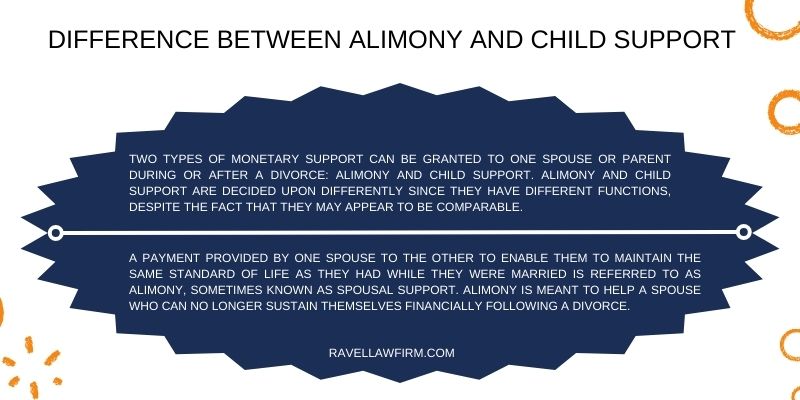Financial support is frequently an important consideration in divorce settlements that can have a big impact on the parties’ lives. Alimony and child support are two types of support payments that frequently come up in divorce proceedings. Despite their apparent similarity, they have various functions and are chosen in different ways. To better understand why alimony and child support are not the same, we will examine their distinctions in this article.

Alimony Vs Child Support
Alimony and child support are two distinct types of financial support that are frequently awarded by divorce courts. Despite the fact that they both aim to support a former spouse or children financially following a divorce, there are important distinctions between the two.
After a divorce, one spouse will pay the other alimony, often referred to as spousal support, to help maintain the recipient’s level of living. When one partner has a much larger income or earning capacity than the other, or when one partner gave up their own profession or schooling to assist the other during the marriage, alimony is frequently granted. Alimony is meant to assist the lower-earning spouse in maintaining a comparable standard of living following the divorce.
The length of the marriage, each spouse’s earning potential, and the level of living throughout the marriage are some of the variables that affect the amount of alimony that is given. In some circumstances, alimony may be granted either permanently or for a predetermined length of time, such as a few years.
Contrarily, child support is a sum of money given to the other parent following a divorce or legal separation to help meet the financial needs of the kid. To ensure that the children’s fundamental needs—including those for food, clothing, shelter, and education—are met, child support is a legal requirement. The amount of child support that is typically given depends on a formula that considers the income of both parents, the number of kids, and how much time each parent spends with the kids.
Child support is often obligatory and non-negotiable, unlike alimony. The court has the authority to compel the payment of child support, and failing to do so may have legal repercussions, including wage suspension or even jail. It’s crucial to understand that alimony and child support are two different things. Child support is meant to sustain the children, whereas alimony is meant to help the spouse who makes less money.
Check Also: Alimony In Texas
Difference Between Alimony And Child Support
Two types of monetary support can be granted to one spouse or parent during or after a divorce: alimony and child support. Alimony and child support are decided upon differently since they have different functions, despite the fact that they may appear to be comparable.

A payment provided by one spouse to the other to enable them to maintain the same standard of life as they had while they were married is referred to as alimony, sometimes known as spousal support. Alimony is meant to help a spouse who can no longer sustain themselves financially following a divorce.
The length of the marriage, each spouse’s income and future earning potential, their standard of living throughout the marriage, as well as their age and health, may all be taken into account when establishing the amount and length of support payments.
Contrarily, child support is a sum of money paid to the custodial parent by the non-custodial parent to assist with paying for the kid’s upbringing. Child support is meant to make sure that the child’s needs are addressed and that they can continue to live as comfortably as they did throughout the marriage. The income and earning potential of each parent, the number of children involved, and the needs of the kid may all be taken into account when calculating the amount of child support.
In both situations, the court will determine the proper level of support based on state criteria. These recommendations take into account variables including income, costs, and the number of kids involved. But, if there are exceptional circumstances that call for a different approach, the court may stray from these rules.
The ultimate objective of alimony and child support is to give the recipients financial security and ensure that they can maintain a similar quality of living to that which they enjoyed while they were married. The court can establish the right amount of support that satisfies these purposes by taking into account the particulars of each case.
You May Also Read: How To Avoid Paying Alimony
FAQ’s
What is the highest alimony payment?
According to reports, the divorce deal between Amazon CEO Jeff Bezos and his ex-wife, MacKenzie Scott, included the largest alimony payment of $1 billion.
Is child support mandatory in divorce?
Child support is required in divorce since it is a legal requirement that parents provide for their children financially.
Can parents agree to no child support?
Parents may agree to no child support, but the court may not necessarily recognize such an agreement if it is found to be detrimental to the child’s best interests.

Hi, I’m Brian Gary; I have my Doctor of Juridical Science (SJD) degree from SMU Dedman School of Law in Dallas. Over the years, I have dealt with many families and successful corporate Legal cases. I have counseled many people on legal matters, and along with my profession, I write about Law on my blog. Please feel free to contact me for counseling/case discussion; I’ll be happy to help you.